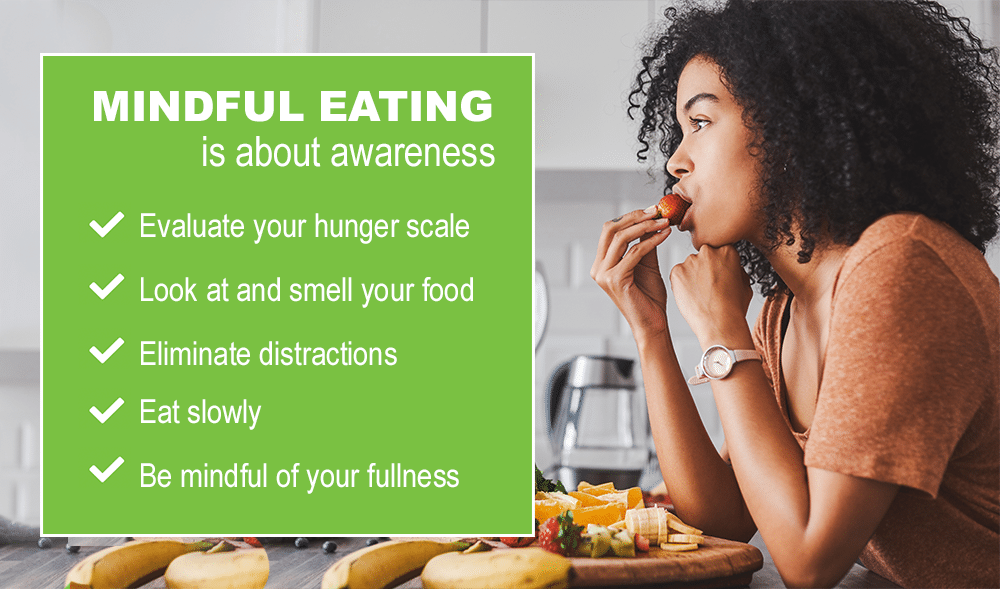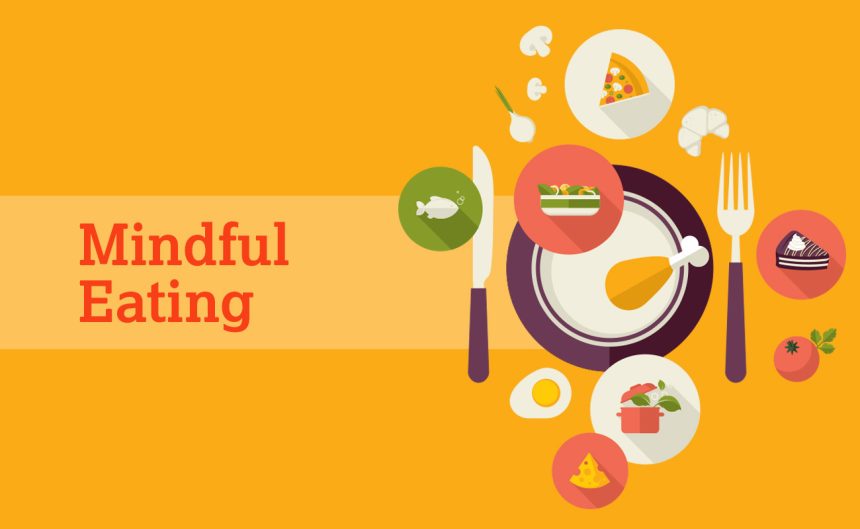Spending some time focusing on the experience of food can help improve your eating habits. Appetite suppression or even weight loss. So you start eating mindfully.
What is a sensible diet?
Mindful eating means being aware of the ways in which the foods you put into your body. It’s about how food makes you feel and what signals your body sends about pleasure, satisfaction and contentment. Mindful eating involves recognizing and accepting the feelings, thoughts, and body sensations you notice. Better judge. This can extend to the process of purchasing, preparing and serving your food. So is the supply chain
For many of us, our busy lives often lead to fast food. At the computer desk or watching TV on the couch. We eat mindlessly and hoard food, whether we’re still hungry or not. In fact, we tend to eat for reasons other than hunger. To satisfy emotional needs, reduce stress, or combat unpleasant feelings such as depression, anxiety, loneliness, or boredom, eating mindfully is the opposite of this unhealthy “conscious” eating.

Mindful eating does not mean perfection. Always eat the right things or never allow yourself to eat on the go. And it’s not about strict rules about how many calories you can eat or what foods should or shouldn’t be in your diet. It’s about focusing and being present with all your senses while cooking, serving and eating.
While mindfulness may not be for everyone, many seem to feed this way. Even eating out a few times a week can help you be more in tune with your body. It can help you avoid overeating. This makes it easier to change your eating habits for the better. And enjoy the luxury that comes with healthy eating.
The benefits of mindful eating
Paying close attention to how you feel when you eat – the texture and taste of each bite. Hunger Signals and Confidence in Your Body How Different Foods Affect Your Energy and Mood You can have: You can learn to enjoy eating food and experience eating it. It keeps you full by eating less. and influences informed decisions about what to eat in the future. It can also help you eliminate unhealthy foods and eating habits.
Mindful eating can help.
- Reduce stress and anxiety
- Track and change your relationship with food to see if you are craving food for reasons other than hunger, for example.
- Enjoy the foods you eat as you learn to cut back on your meals and snacks and appreciate your meals and snacks more.
- Choose healthy foods by paying attention to how you feel after each meal.
- Improve digestion by eating slowly.
- Feel full faster and eat less food
- Pay extra attention to where your food comes from, how it’s prepared, and how long it stays on your plate.
- A balanced and healthy diet
How to learn to eat mindfully
- To learn mindfulness, you must participate in activities with full attention. Drive yourself for mental food while reading, talking on the phone, watching TV, daydreaming, or doing something later. When your mind wanders, slowly bring your attention back to your food and the experience of preparing, serving and eating it.
- Try practicing mental eating for five minutes at first, then gradually increase from there. And remember. When you’re making shopping lists or browsing restaurant menus, you can eat mindfully. Carefully review each item you add to your list or select from a list.
- Start by taking a deep breath and thinking about the health benefits of each food. While nutritionists are always arguing about which foods are “healthy” and which are unhealthy. The best rule of thumb is to get as close as possible to how nature did it.
- Use all your senses when shopping, cooking, serving and eating. Food looks, smells and feels cut. What sounds do you make while cooking?
- Match your appetite. How hungry are you? I want to come to the table hungry. But I don’t want to go hungry after fasting. Know your intention to eat food. You eat because you are really hungry, bored and want to distract yourself. Or do you think you should?
- Keep your food to yourself and before you eat, take a moment to appreciate the food and the people you eat with. Pay attention to texture, size, color, smell of food. How do you react to food and how does it smell?
- Notice how it feels in your mouth after you take a bite. How would you describe the texture? Try to identify all species. Pay attention to how it cooks and how it feels when all the different flavors are cooked properly.
- Notice how your experience changes from one moment to the next. Does it sound perfect? Are you satisfied? Take your time and be where you are, don’t rush.
- Place the pan on the floor while cooking. Before you pull out your tools again, take a moment to think about how you feel (hungry, full). Listen to your stomach, not your plate.
- Express gratitude and think about the source of your food. Related plants and animals and all the people who have to move food and put it on your plate. This helps you to make smart and sustainable decisions.
- Keep eating slowly. Also pay attention to your body’s signals of fullness when you interact with your dinner companions. If you eat alone, come and eat with us.
Integrate mindful eating into your life.
For many of us, it’s unrealistic to think we can stay awake with every bite or meal. Maybe take a deep breath. Before you eat or snack, think about what you put in your body. Do you eat in response to hunger or mood? Are you bored, anxious or lonely?
So is this healthy or comfort food? You can spend a few minutes focusing on your food instead of being distracted by your phone or cell phone. Think of mindful eating as exercise. Enough to eat slowly. Just focus on the eating process and listen to your body while enjoying your food. It also gives you more control over your food and eating habits.
Use mindfulness to explore our relationship with food.
Whether you know it or not, nutrition has a huge impact on your health. Bodily sensations can affect emotional response and how your mind is taken care of boosts your energy and outlook. Resource depletion and feeling exhausted Mood swings and irritability
We all know that we should eat less sugar and more processed foods and fruits and vegetables. If you eat mindfully and according to your body, no one suffers. You start to get a feel for different foods. How does it affect your body, mind and mood? This makes it much easier to make healthy changes to your diet, for example if you find that eating sugary snacks makes you feel worse when you are tired or depressed. It’s easy to control those cravings and opt instead for healthy snacks that boost your energy and mood.
Most of us are only interested in how food makes us feel when we are sick. How much energy and excitement do you have after a meal or snack?

How does your diet make you feel?
Want to fully explore your relationship with food? It is important to realize that these are different foods. How do you think you feel after swallowing food? How do you feel 5 minutes, 1 hour or hour after eating? How do you generally feel during the day?










